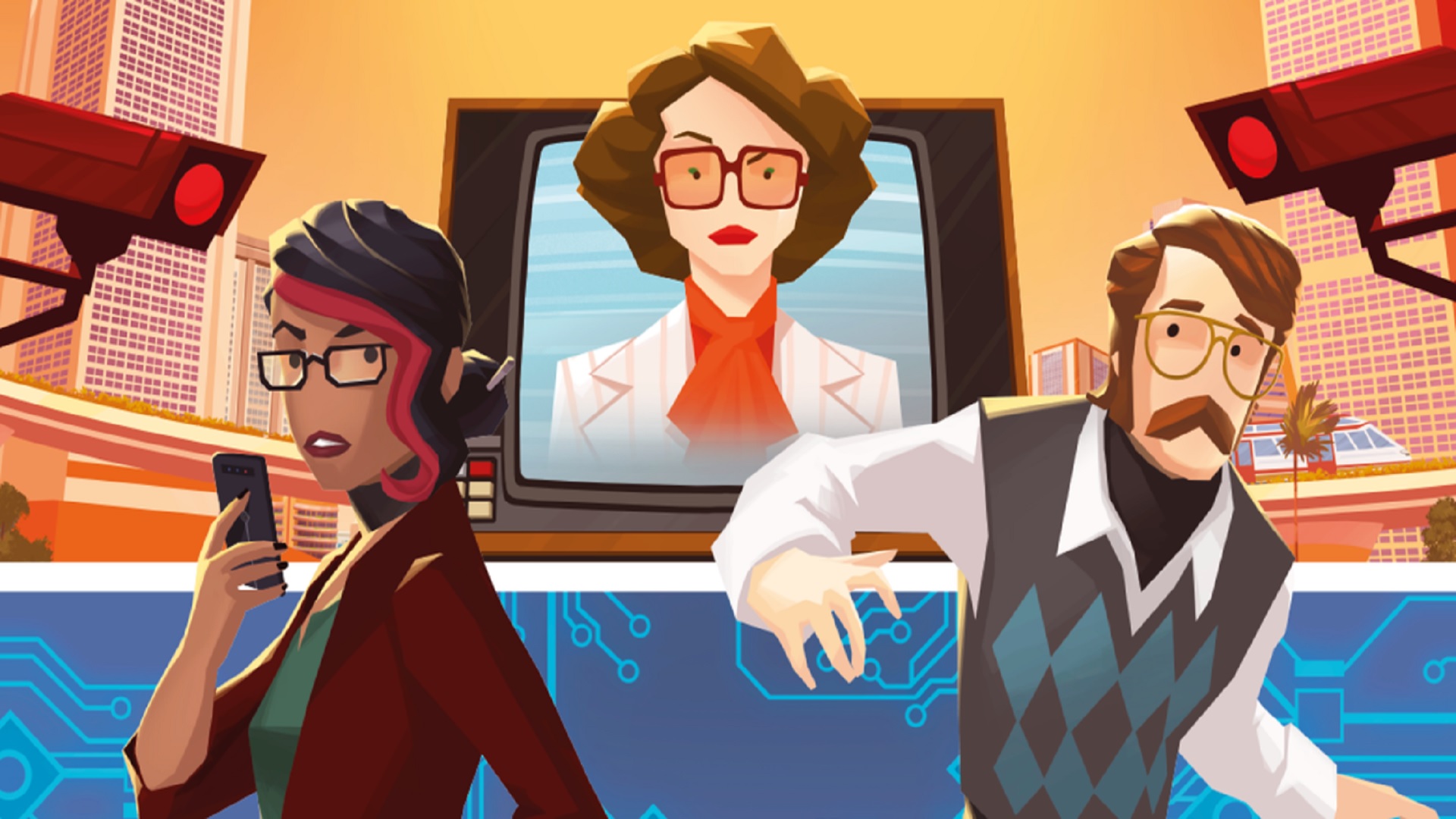
Like the '70s fashions on display throughout American Arcadia, the game's premise seems a little dated. In essence, it's a blend of 20th century sci-fi films The Truman Show and Logan's Run, and as such feels like its big ideas were successfully combed through years ago. But then, as the makers of the game's featured reality TV show would surely understand, audiences love a retro revival, especially if it's stylish, smart, and highly entertaining. And thankfully, American Arcadia checks those boxes and more.
Release date: November 15, 2023
Platform(s): PC
Developer: Out of the Blue
Publisher: Raw Fury
Indeed, you might be struck on numerous occasions by the notion that American Arcadia would make a great comedy action movie or mini-series. Story similarities with the aforementioned cinematic inspirations are one reason for that, of course, but also the whole production has a snappy, polished quality. A sharp-tongued script and voice performances from Yuri Lowenthal and Krizia Bajos lead the way, yet more than that, the experience is staged, shot, and edited with a tempo that seems more suited to holding a bucket of popcorn than a controller.
At the same time, however, developer Out of the Blue uses these switches of scene and perspective to ensure that what you do is even more amusing than what you see and hear. Cutting between two main characters, American Arcadia is a 2.5D platformer, a little like Inside, but only until it isn't and becomes a first-person puzzle game instead. And more delightful still than the playful back and forth between these two styles is when they merge together, asking you to juggle the efforts of both protagonists at once.
Split Decisions
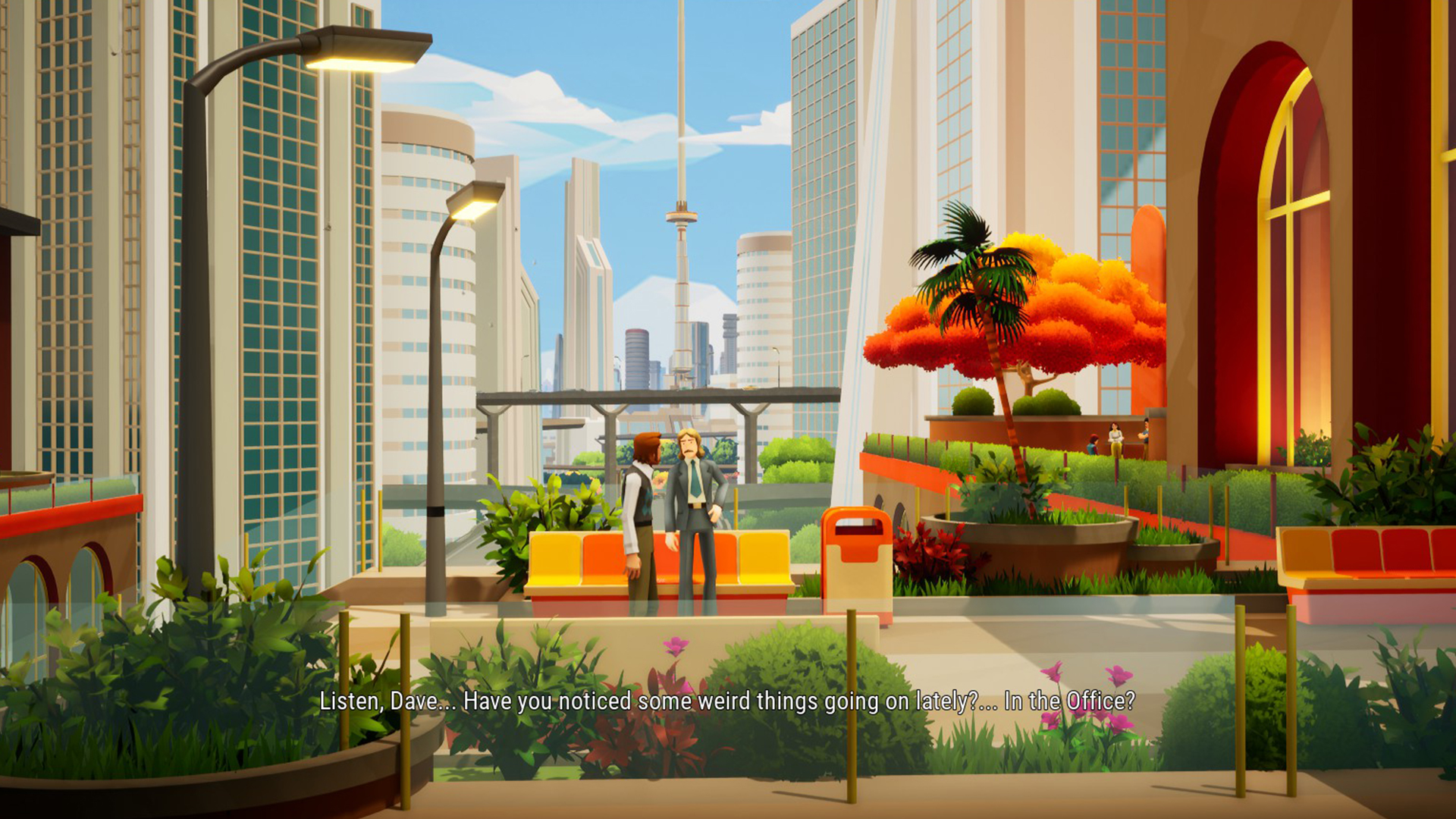
So how does that work? Well, American Arcadia is the story of Trevor Hills, a citizen of the idyllic titular community who goes on the lam when he discovers disturbing secrets behind the scenes, not least that there is such a thing as behind the scenes in the first place. But it's also the story of Angela Solano, an employee of Walton Media, the company that controls, films and televises the life in the domed city, who tries to help Trevor escape. In short, Trevor runs and hides in the '70s themed bubble, while Angela works outside, hacking systems from her computer or phone to grease the wheels of his progress.
In practice, then, as you make Trevor run, sneak, and jump from security forces, you're often watching the action remotely through Angela's eyes, and at indicated points you can have her meddle in the scene – open a locked security shutter, perhaps, turn off lights to keep Trevor hidden, or hack a drone to zap pursuing guards. In chase sequences, these interventions are generally simple because they have to be well timed and executed quickly, although even then hitting the necessary cues has an air of trial and error. Expect a few failures before you figure out exactly what to do and when to do it each time.
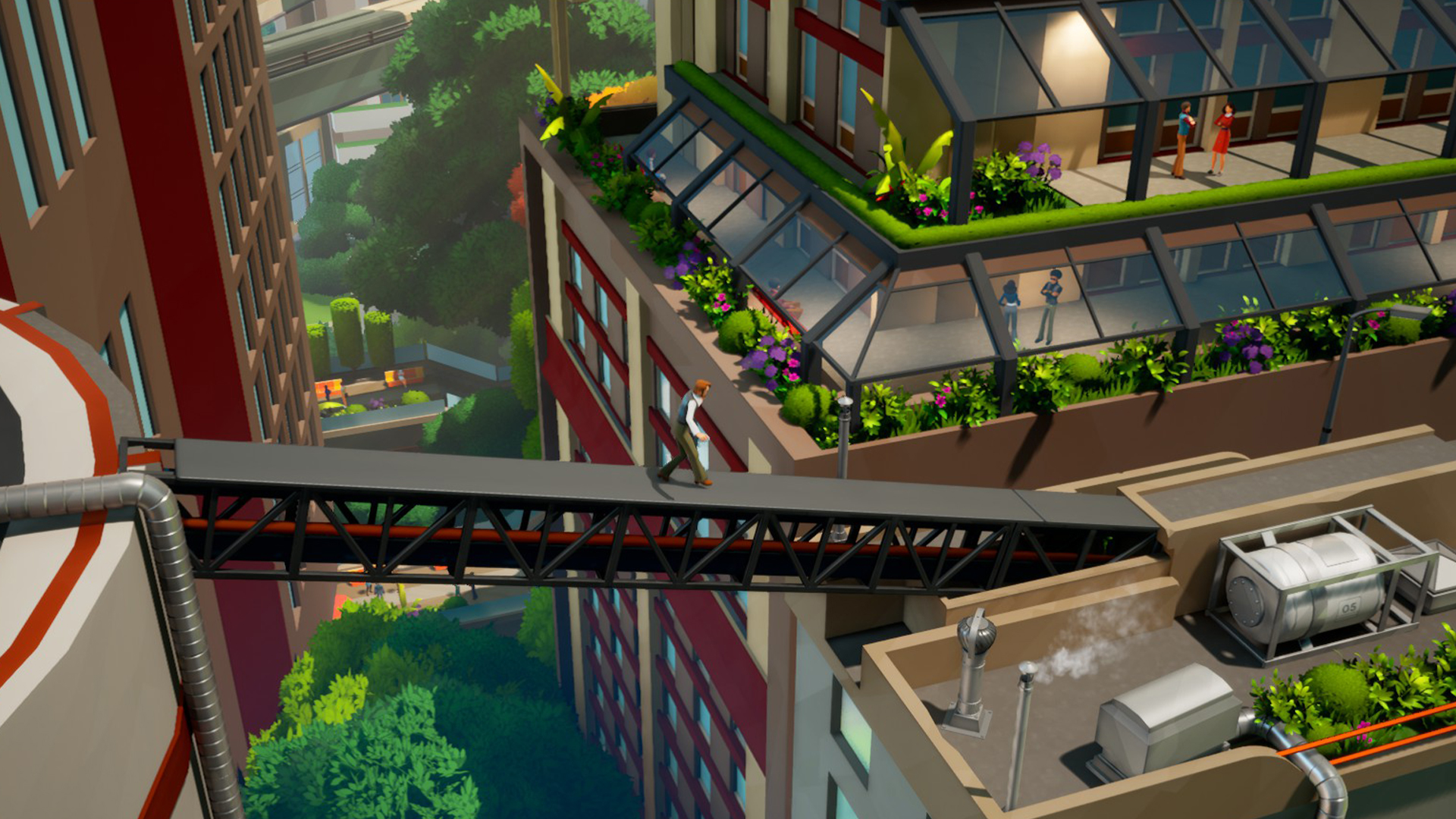
If the pattern memorising here is a touch old-school, though, none of it is overly taxing, and the results are both exciting – especially with a dose of funky music – and a wonderfully inventive twist on familiar puzzle platformer conundrums. In one standout sequence, for example, an otherwise regulation stealth section running between cover points gains an extra dimension when Angela's attention is divided between two screens. Now you have to keep looking left so you can see what you're doing with Trevor, while working through a series of timed multiple choice questions on the right.
On top of that, Angela also sometimes leaves Trevor to his own devices for a while, particularly once suspicions arise outside Arcadia that someone is aiding the fugitive. In these scenes you take direct control of the technician in the workplace or at home, and more intricate puzzles are tossed into the mix, built upon situations such as hacking security cameras by feeding in looped footage or hiding incriminating evidence from a snooping supervisor. A few of these scenarios are a little contrived, but there's pleasing variety in the bespoke problems that emerge, each introducing its own brain tickling mechanisms.
That '70s Show
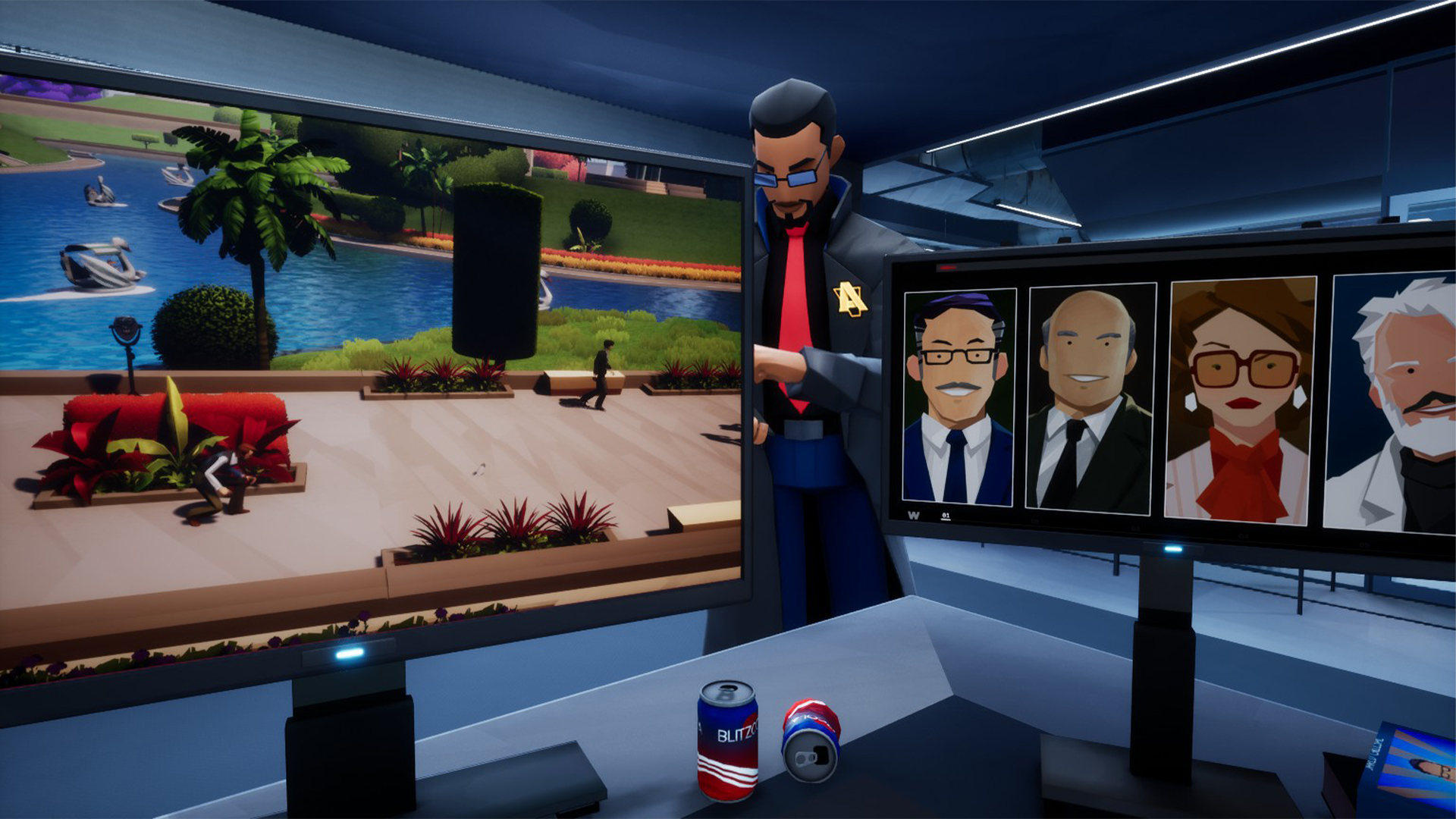
All this switching about does more than simply increase the range of activities, too. For one, the contrast in perspectives between Trevor and Angela's efforts neatly sums up their circumstances – Trevor, stuck on a single plane, is struggling for liberty, while Angela's free first-person movement is hampered by modern tech. But also, the bright, clean design of Arcadia perfectly projects a fantasy of middle-class comfort and simpler, better times, while the mundane messy present reveals the lie beneath.
What a fantasy Arcadia is, though. The pseudo-'70s vibe within blooms with bold shapes – collars are wide, the town monorail feels like the future, and orange is the new black, brown, and anything in between. Every fitting, fixture and façade isn't so much designed as over-designed, in fact, gaudy yet architecturally remarkable with it, whether Trevor is sitting down to work or skulking about the corridors of a luxury hotel. American Arcadia is a version of Inside where the nightmare world is an endless Google office interior.
Of course, for Trevor, a moustachioed insurance bore who knows no other life, there's a major shock in store when he learns the truth, and with that his earpiece conversations with activist Angela unearth a rich vein of comic potential. Arguably, their cultural disparity and odd couple energy could have been mined deeper than it is, but both characters possess a supply of crackling banter that colours in their personalities. Trevor in particular is an ideal anti-action hero, who barely rises to the occasion with sweaty palms and a nerd's eye view. "They sent a helicopter after me?" he shouts, "That's got to be expensive!"
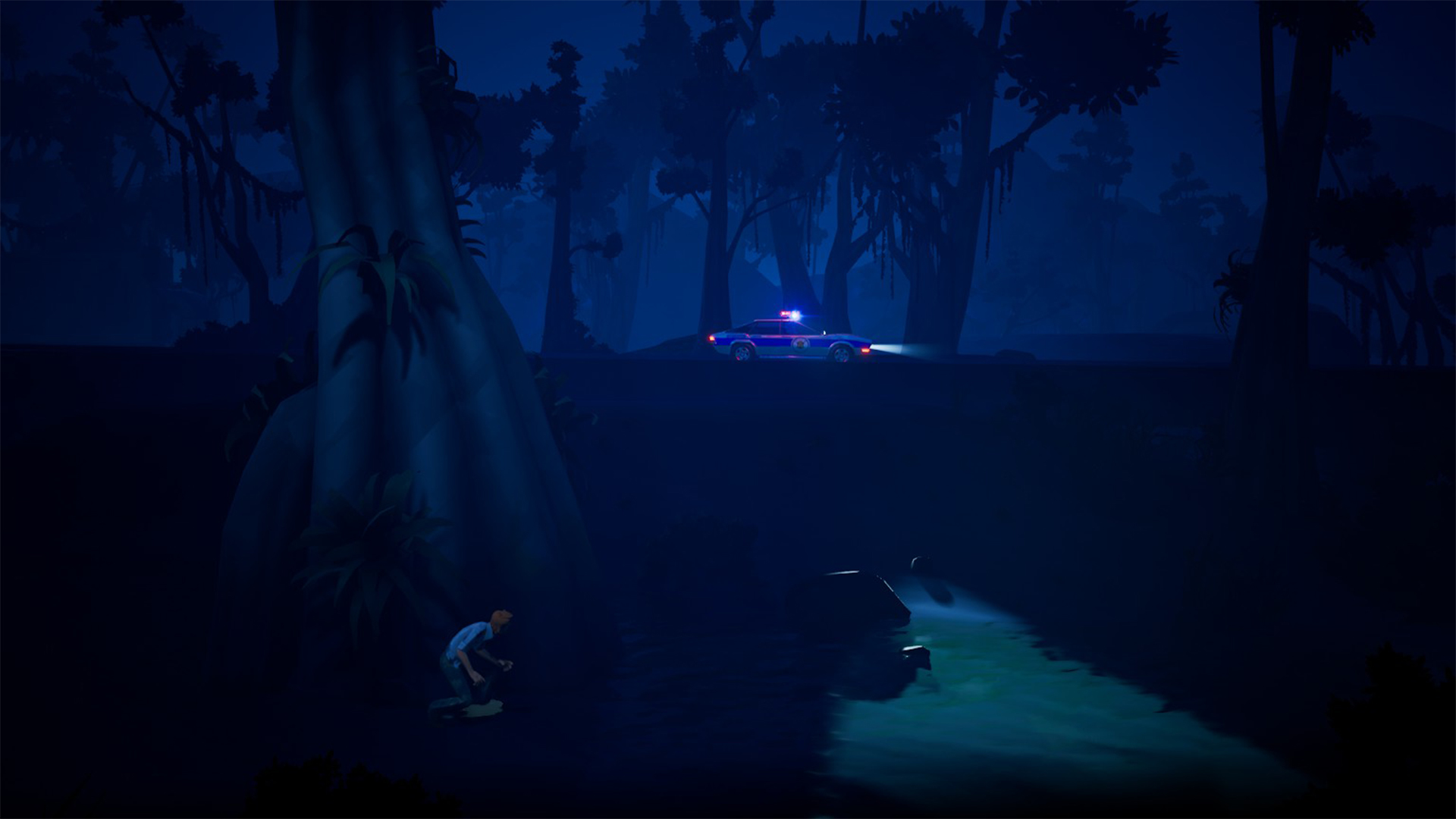
That said, American Arcadia is a little too indulgent with its dialogue and backstory, at times almost forgetting that it needs to give you something interesting to do. Between ingenious edits – splicing in after-the-fact interviews with the protagonists, for instance – and inspired framing – such as viewing Trevor on a social media feed with live comments – come lulls that turn the stimulating active experience passive. If the whole game moved along such lines, it may not have been so incongruous, but here it feels strange to go from engaging puzzles in one scene to holding right on an analogue stick in the next. A couple of driving sequences stand out especially, promising a car chase that never arrives.
While it sags occasionally, though, American Arcadia continues to stash plenty of tricks up its wide-cuffed sleeves, and ultimately even that rerun of a premise goes deeper than you might expect. In its own wild and glamorous way, the story sends its daring duo into an endless spiral where reality and freedom become less tangible with each rotation, leaving you something to chew on once the credits roll and the smile subsides. For a cinema-inspired story about a TV show, American Arcadia makes for a highly entertaining game.







